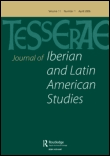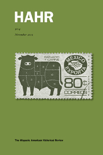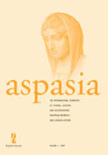
Journal of Iberian and Latin American Studies
Scope & Guideline
Unlocking the diverse histories and languages of two vibrant regions.
Introduction
Aims and Scopes
- Historical Analysis of Political Movements:
The journal emphasizes in-depth studies of political movements across Latin America and the Iberian Peninsula, exploring themes such as democratization, feminism, and anti-imperialism, particularly during the 20th century. - Cultural Studies and Identity Formation:
There is a consistent focus on cultural dynamics, including the construction of national identities, race relations, and the impact of historical events on cultural practices and beliefs. - Transnational Perspectives:
The journal highlights transnational studies that examine the interconnectedness of Iberian and Latin American histories, including migration, colonialism, and the effects of globalization. - Gender and Sexuality:
A core area of research is the exploration of gender roles, feminist movements, and sexuality within historical contexts, reflecting on their implications for modern society. - Anarchism and Leftist Thought:
The journal contributes to the understanding of anarchism and other leftist ideologies, particularly in relation to their historical and social contexts in Spain and Latin America.
Trending and Emerging
- Democratization and Political Culture:
Recent publications emphasize the processes of democratization and political culture in Latin America, particularly in the context of historical movements and their contemporary implications. - Feminism and Women's Rights:
The journal is increasingly focusing on feminist movements and women's rights, particularly in relation to suffrage and social inclusion, highlighting their historical significance and ongoing relevance. - Intersectionality in Historical Analysis:
There is a growing trend towards intersectional analysis that examines how race, class, and gender intersect in historical narratives, providing a more comprehensive understanding of societal dynamics. - Migration and Transnationalism:
Research on migration patterns and transnational connections is gaining traction, reflecting a broader interest in the complexities of identity and belonging in a globalized world. - Cultural Memory and Historical Narratives:
Emerging studies are exploring cultural memory and the ways in which historical narratives shape collective identities, particularly in relation to trauma and resilience in post-colonial contexts.
Declining or Waning
- Traditional Colonial Studies:
Research centered on traditional narratives of colonialism and its direct impacts is becoming less frequent, as scholars increasingly adopt post-colonial frameworks that emphasize resilience and agency. - Static Historical Narratives:
There is a noticeable decline in papers that present static or unidimensional historical narratives, with a growing preference for dynamic, multifaceted approaches that consider multiple perspectives. - Nationalism and State-Centric Studies:
Themes focused solely on nationalism and state-centric studies are waning, as the journal shifts towards more nuanced discussions that incorporate transnational and global perspectives. - Biographical Studies of Lesser-Known Figures:
Research on lesser-known historical figures is decreasing, likely due to a shift towards broader thematic studies that encompass more significant movements and collective identities. - Conventional Gender Roles in Historical Contexts:
The exploration of conventional gender roles without critical analysis is becoming less common, as the journal increasingly prioritizes intersectional approaches to gender and sexuality.
Similar Journals

Dirasat Hispanicas-Revista Tunecina de Estudios Hispanicos
Advancing Knowledge in Hispanic Linguistics and LiteratureDirasat Hispanicas-Revista Tunecina de Estudios Hispanicos is a pivotal academic journal published by UNIV TUNIS MANAR, INST SUPERIEUR SCIENCES HUMAINES TUNIS, dedicated to the exploration and analysis of Hispanic studies within the broader context of history, linguistics, and literature. Established in Tunisia, this journal has transitioned to an Open Access model since 2014, promoting the dissemination of knowledge and fostering scholarly exchange among researchers, professionals, and students globally. With its ISSN 2286-5977 and esteemed recognition in various categories, including Q4 in History and Linguistics and Q3 in Literature and Literary Theory, Dirasat Hispanicas strives to bridge gaps in Hispanic scholarship by inviting diverse critical perspectives and innovative research. While its Scopus rankings reflect an evolving presence in the academic landscape, the journal remains committed to enhancing the visibility and impact of Hispanic studies. The journal continues to encourage submissions that contribute to its mission of intellectual advancement, making it an essential resource for those engaged in the rich tapestry of Hispanic cultural and linguistic heritage.

HAHR-Hispanic American Historical Review
Exploring the Depths of Hispanic HeritageHAHR-Hispanic American Historical Review, published by DUKE UNIVERSITY PRESS, is a prestigious scholarly journal dedicated to the field of Latin American and Hispanic studies. With its ISSN 0018-2168 and E-ISSN 1527-1900, this journal boasts a remarkable reputation, as evidenced by its Q1 ranking in both Cultural Studies and History for 2023, placing it among the top tier of its category. The journal has consistently contributed to academic discourse since its inception in 1962, with a notable convergence of historical scholarship focused on the Hispanic American experience through 2024. HAHR is not open access, ensuring its publication standards resonate within a scholarly context that emphasizes rigorous peer review and academic integrity. Housed in the vibrant academic community of Durham, NC, this journal serves as an essential resource for researchers, professionals, and students alike, providing critical insights and fostering a deeper understanding of Hispanic heritage and history.

Historia-Santiago
Unlocking the Past: Open Access to Innovative HistoriesHistoria-Santiago is an esteemed academic journal published by the Pontificia Universidad Católica de Chile, Instituto de Historia. Since its inception in 2000, the journal has embraced an Open Access model, facilitating broad dissemination of historical research and ensuring that critical scholarly work is freely accessible to researchers, professionals, and students around the globe. With a focus on Latin American history, Historia-Santiago provides a platform for innovative research and contributions that engage with diverse historical narratives and methodologies. The journal aims to foster interdisciplinary dialogue and stimulate scholarly debate, thereby enriching the understanding of historical contexts and their implications in contemporary society. By maintaining high academic standards, Historia-Santiago occupies a vital role in the field of historical studies, encouraging authors to explore new ideas and perspectives that shape the understanding of our past.

LATIN AMERICAN RESEARCH REVIEW
Bridging gaps in knowledge through interdisciplinary exploration.LATIN AMERICAN RESEARCH REVIEW, published by Cambridge University Press, is a premier open-access journal dedicated to advancing scholarship in the field of Latin American studies. Established in 1970, the journal has consistently evolved to address critical interdisciplinary issues, encompassing a broad spectrum of topics from anthropology and cultural studies to economics and political science. With its strong impact reflected in 2023's quartile rankings, including Q1 in both Cultural Studies and History, LATIN AMERICAN RESEARCH REVIEW ranks among the top-tier journals in multiple disciplines, capturing the interest of scholars worldwide. This journal not only fosters a deeper understanding of Latin America's diverse cultures, histories, and socioeconomic landscapes but also serves as a vital platform for innovative research and discussions. By offering open access since 2017, it ensures that its valuable contributions are widely disseminated, making it an indispensable resource for researchers, professionals, and students alike who are looking to engage with contemporary Latin American issues.

Universitas-Revista de Ciencias Sociales y Humanas
Connecting Ideas, Expanding HorizonsUniversitas-Revista de Ciencias Sociales y Humanas is a distinguished academic journal published by the Salesian Polytechnic University of Ecuador, aimed at advancing research and knowledge in the fields of social sciences and humanities. With an ISSN of 1390-3837 and an E-ISSN of 1390-8634, this journal has embraced the Open Access model since 2002, ensuring that its valuable content is freely accessible to researchers, practitioners, and students globally. Situated in Cuenca, Ecuador, this journal serves as a vital resource for exploring interdisciplinary approaches and contemporary issues in social sciences, offering a platform for rigorous scholarly discourse and innovative research. Given its commitment to quality and accessibility, Universitas plays a crucial role in fostering academic collaboration and advancing the frontiers of knowledge in Latin America and beyond.

Aspasia
Empowering voices in the study of gender and history.Aspasia is a distinguished open-access journal dedicated to the fields of Gender Studies and History, published by BERGHAHN JOURNALS and based in the United Kingdom. Since its inaugural issue in 2011 and achieving open access in 2019, Aspasia has committed to providing a platform that explores diverse scholarly perspectives on women's experiences and gender dynamics within historical contexts. With an impact factor reflective of its rigorous peer-review process, Aspasia has achieved notable rankings, including Q4 in Gender Studies and Q3 in History for 2023, indicating its growing influence within these disciplines. The journal is indexed in prominent databases, showcasing its relevance and contribution to ongoing academic discourse. Researchers, professionals, and students are encouraged to explore its rich content, fostering critical dialogue and advancing knowledge in the understanding of gender and historical narratives.

Anduli
Empowering Voices through Open Access ResearchAnduli is a prominent academic journal published by the University of Sevilla, Faculty of Communication, dedicated to exploring the multifaceted realm of communication studies. With its commitment to Open Access since 2002, the journal ensures that its scholarly content is readily available to researchers, professionals, and students globally, fostering an inclusive dialogue around contemporary communication issues. The journal holds an ISSN of 1696-0270 and an E-ISSN of 2340-4973, which signifies its credibility and reach within the academic community. Although specific impact metrics such as HIndex and Scopus ranks are currently unavailable, Anduli is recognized for its significant contribution to the development and dissemination of knowledge in communication disciplines. By publishing original research articles, reviews, and critical essays, the journal aims to address emergent trends and challenges in communication, making it an indispensable resource for scholars and practitioners alike. Whether you are delving into media studies, intercultural communication, or digital discourse, Anduli stands as a vital outlet for innovative research and thought leadership.

Revista Numismatica Hecate
Illuminating the Intersections of Money and MemoryRevista Numismatica Hecate stands as a pivotal academic journal in the realm of numismatics and archaeology, published by the esteemed REVISTA NUMISMATICA HECATE in Spain. Since its inception in 2014, this Open Access journal has committed itself to advancing scholarly discourse on historical currency and related archaeological findings. With an impact factor reflective of its growing influence, it has been categorized in 2023 as a Q3 journal in both the Archaeology (Arts and Humanities) and Archaeology segments, ranking in the lower quartiles among its peers yet showcasing a developing stature in the academic landscape. Articles published in this journal are accessible to a global audience, providing valuable insights for researchers, professionals, and students interested in the intricate relationships between currency, culture, and history. As it continues to converge on the latest findings and theoretical advancements in the field, the Revista Numismatica Hecate remains an essential resource for those keen to explore the rich tapestry of numismatic study.

MEXICAN STUDIES-ESTUDIOS MEXICANOS
Enriching Academic Discourse on Mexico's LegacyMEXICAN STUDIES-ESTUDIOS MEXICANOS, published by University of California Press, is a distinguished journal that explores critical issues in the fields of cultural studies and history, with a keen focus on Mexican and Latin American contexts. Established in 1985, this journal serves as an invaluable platform for researchers, professionals, and students alike, aiming to deepen understanding of Mexico's complex social, cultural, and historical landscapes. With an impressive placement in the Q2 category in both Cultural Studies and History, it ranks within the top tiers of scholarly discourse, demonstrating a strong impact factor that reflects its significance in the academic community. Although it does not currently offer Open Access, the journal remains committed to delivering high-quality, peer-reviewed research that stimulates ongoing debates and enriches scholarship in the humanities and social sciences. Nestled at the heart of scholarly conversations, MEXICAN STUDIES-ESTUDIOS MEXICANOS continues to play a pivotal role in advancing academic inquiry into Mexico's past and present.

International Journal of Latin American Religions
Unveiling the Spiritual Landscape of Latin AmericaInternational Journal of Latin American Religions, published by SpringerNature, is a leading peer-reviewed journal dedicated to advancing the understanding of religious practices, beliefs, and developments across Latin America. Since its inception in 2017, the journal has established a prominent position in critical fields, earning distinguished Q1 and Q2 rankings in History, Religious Studies, and Anthropology, which reflects its commitment to high-quality scholarship and research influence. With a Scopus rank that places it within the top percentiles of its discipline, the journal offers an integrative platform for scholars and practitioners to explore the diverse tapestry of Latin American religions. The Open Access model promotes greater visibility and accessibility of research findings, fostering collaborations among a global audience. This journal plays a pivotal role in synthesizing academic discourse and fostering innovative research, making it an essential resource for researchers, professionals, and students passionate about the intricate interplay of culture, history, and spirituality in Latin America.